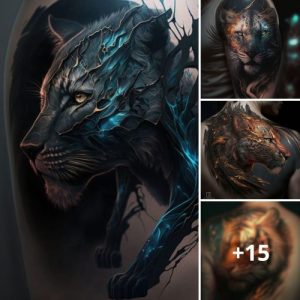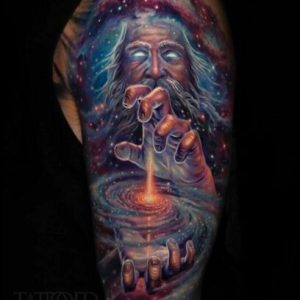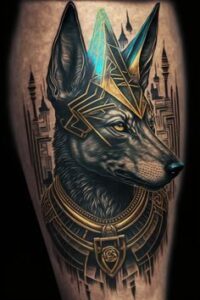
Anubis, the enigmatic jackal-headed deity of ancient Egypt, has held a timeless allure, captivating individuals across centuries with his mysterious symbolism and intriguing mythology. Among the various ways people express their fascination with this ancient figure, Anubis tattoos stand out as powerful symbols that carry deep meanings and tell unique stories.
In this exploration, we will delve into the captivating world of Anubis tattoos, unraveling the symbolism, historical significance, and the diverse narratives they represent.
Anubis: The Guardian of the Dead
Depicted with the head of a jackal atop a human body, Anubis played a pivotal role in ancient Egyptian beliefs. He served as the guardian and protector of the deceased, ensuring a smooth transition from the earthly realm to the afterlife. Anubis tattoos, adorned by individuals globally, symbolize a profound connection to the world beyond, acting as protective talismans that offer guidance and safe passage to the realm of the dead.
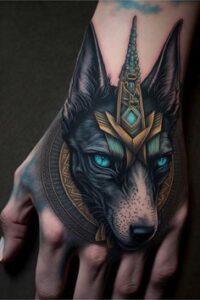
Balancing Life and Death: The Scales of Judgment
Anubis is frequently portrayed with scales, an emblem of the judgment of the dead. The scales represent the weighing of the heart against the Feather of Ma’at, symbolizing the balance between life and death. Anubis tattoos carry the meaning of this delicate equilibrium, urging individuals to lead virtuous lives and seek spiritual harmony in the face of mortality.
Transformation and Rebirth
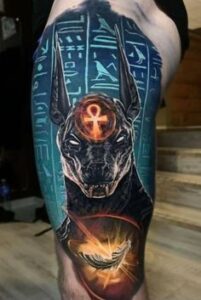
Anubis’s association with death and the afterlife extends beyond guardianship; it signifies transformation and rebirth. Anubis tattoos serve as reminders that change is an intrinsic part of existence, and every ending paves the way for a new beginning. The symbolism encapsulated in these tattoos encourages wearers to embrace the cyclical nature of life and find beauty in the constant process of renewal.
Cultural and Historical Weight of Anubis Tattoos

Beyond personal symbolism, Anubis tattoos carry the weight of ancient Egyptian beliefs in the afterlife. The rich cultural heritage of Egypt, with its intricate mythology and reverence for the divine, is honored through these tattoos. By wearing Anubis tattoos, individuals not only express personal beliefs but also pay homage to an ancient civilization that held strong convictions about the journey beyond life.
Anubis in Popular Culture
The influence of Anubis extends far beyond the boundaries of ancient Egypt, permeating contemporary popular culture. From literature and cinema to art and fashion, Anubis continues to inspire and captivate audiences worldwide. His enduring presence in various forms of media highlights the timelessness of his symbolism, connecting people across different eras and cultures.
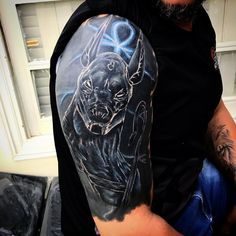
In conclusion, Anubis tattoos are not merely ink on skin; they are intricate narratives, weaving together personal stories, ancient beliefs, and cultural heritage. As wearers proudly display these symbols, they contribute to the ongoing saga of Anubis, ensuring that the guardian of the dead continues to inspire and guide, transcending both time and borders.

